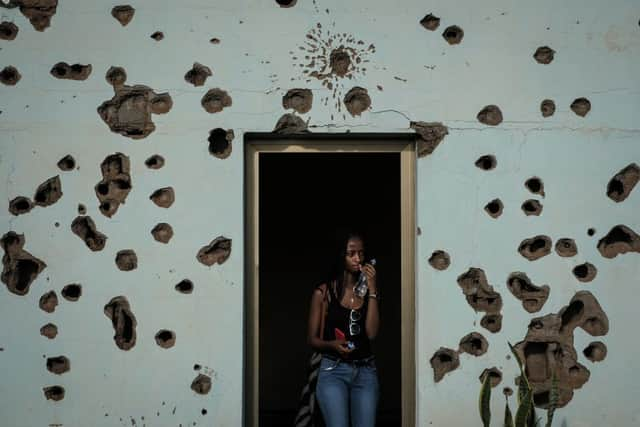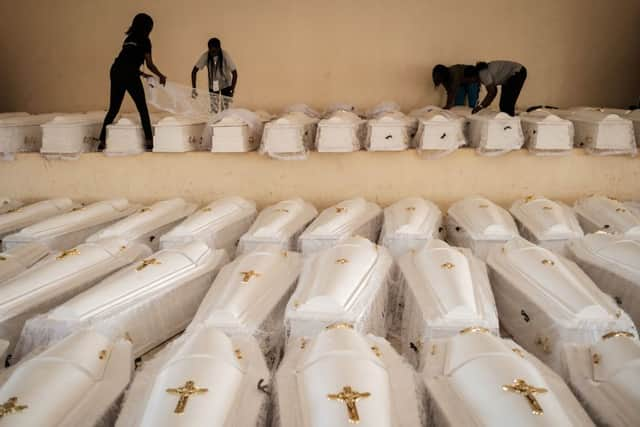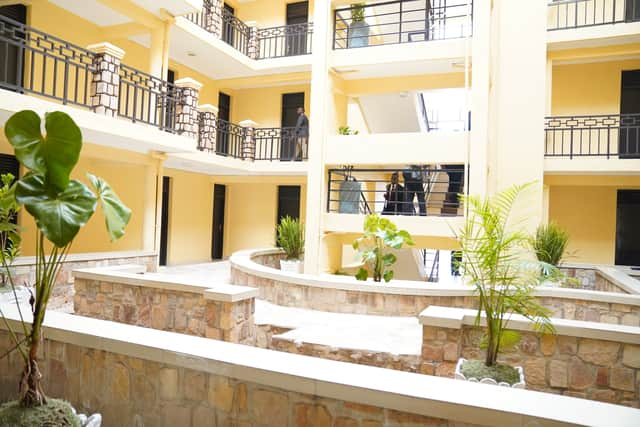Is Rwanda safe? Travel advice, population density, human rights record - as UK asylum seekers flight departs
This article contains affiliate links. We may earn a small commission on items purchased through this article, but that does not affect our editorial judgement.
and live on Freeview channel 276
After the initial trip was cancelled due to last-minute intervention by the European Court of Human Rights (ECHR), Priti Patel claimed that preparation for the next deportation flight to Rwanda "begins now."
The ECHR announced that it had given an urgent interim measure in the case of an Iraqi person, and that it was reviewing a number of other cases.
Advertisement
Hide AdAdvertisement
Hide AdRefugees living in Rwanda have warned of the challenges those due to arrive on a fight from Britain may face.
Asylum seekers who were resettled in the east African country under past arrangements have warned the Associated Press the latest arrivals should expect a difficult time.
“Sometimes I play football and in the evening I drink because I have nothing to do,” said Faisal, a 20-year-old from Ethiopia who was transferred to Rwanda from Libya in 2019 in the first batch of refugees resettled under a contract with the United Nations.
“I pray daily to God that I leave this place.”
Giving only his first name out of fear of retaliation, he remains at the Gashora shelter built to host refugees who had languished in Libya while trying to reach Europe.
Advertisement
Hide AdAdvertisement
Hide AdControversial new government plans will see asylum seekers and refugees who cross the Channel in small boats flown to Rwanda for processing.
The UK Court of Appeal on Monday (13 June) refused to stop the Government from deporting asylum seekers to Rwanda despite allegations that the scheduled flights would impair the “basic dignity” of those suffering conflict and injustice.
According to Liz Truss, the first flight carrying asylum seekers to Rwanda will depart on Tuesday 14 June, and those who are not removed on Tuesday will be placed on following flights.
Only seven or eight people are scheduled to be taken on the first plane after scores of people won court proceedings to be removed; further legal challenges are expected to be heard in the near future.
Advertisement
Hide AdAdvertisement
Hide AdBut what can refugees and asylum seekers expect from Rwanda? What is the country’s human rights record, and is it welcoming to migrants?
Here is everything you need to know.
What is Rwanda’s human rights record?
Charities have condemned the plans as “cruel and nasty”, and said they will fail to address the issue and cause more “suffering and chaos”, while criticising Rwanda’s human rights track record.
Steve Valdez-Symonds, Amnesty International UK’s refugee and migrant rights director, said that the African nation has a “dismal human rights record”.


In a statement, he said: “Sending people to another country – let alone one with such a dismal human rights record – for asylum ‘processing’ is the very height of irresponsibility.
Advertisement
Hide AdAdvertisement
Hide Ad“This shockingly ill-conceived idea will go far further in inflicting suffering while wasting huge amounts of public money.”
What human rights abuses have taken place?
Rwanda has been accused of human rights abuses on more than one occasion. Perhaps its most infmaous incident is that of the Rwandan genocide of the Tutsi people in 1994.
The crisis lasted 10 days and claimed the lives of 800,000 Tutsi people at the hands of extremist members of another ethnic group called the Hutu, making it one of the fastest genocides the world has ever known.
Hutu militias and the Rwandan army also worked their way through a list of people in the government who were political moderates, so they would not be able to stop the genocide.
Advertisement
Hide AdAdvertisement
Hide AdThey also killed journalists and human rights activists who had spoken out against the killings. 96 individuals were later indicted in the as International Criminal Tribunal for counts of genocide, crimes against humanity or war crimes.
Detention Action said that the men sent to Rwanda would “likely face indefinite detention under a government notorious for violent persecution of dissent”.
The advocacy group added: “At the same time, the UK currently gives asylum to Rwandan refugees fleeing political persecution.”


As recently as 2012, political belligerents have been victim to human rights abuses; the body of Théogène Turatsinze, a businessman who was thought to have "had access to politically sensitive financial information related to certain Rwandan government insiders", was found tied up and floating in the sea.
Advertisement
Hide AdAdvertisement
Hide AdIn 2010, Rwanda entered the ranks of the ten lowest-ranked countries in the world for press freedom, with Reporters Without Borders stating the nation had “joined Burma and North Korea as the most repressive countries in the world against journalists.”
Where will refugees be taken?
The divisive plans are anticipated to initially see people taken to hostels in the Rwandan capital city of Kigali for processing.
Those expected to arrive under Rwanda’s new arrangement with Britain will be accommodated in shelters with features including private rooms, televisions and a swimming pool.
At one, the Hope Hostel, a security officer patrols outside, while clocks in the lobby indicate the times in London and Paris.
Advertisement
Hide AdAdvertisement
Hide AdAhead of the deal with Britain, Hope House was being used as accommodation for tourists, according to Rwandan government officials.
Privately owned, the East African nation’s government is understood to be in negotiations to lease the property so asylum seekers sent from the UK can stay there temporarily while their claims are processed.
Home Secretary Priti Patel made a private visit to the site earlier this year to see an example of what accommodation may be on offer; this is understood to be Patel’s first visit to Rwanda since the deal was thrashed out.


The complex has 50 rooms at present and can accommodate around 100 people with up to two people per room and sharing communal bathrooms.
Advertisement
Hide AdAdvertisement
Hide AdThere are plans to expand the facility by building more accommodation blocks, eventually seeing it offer 150 rooms and able to sleep up to 300 people.
According to a TripAdvisor review for a Hope Guest House in Kigali, “the room [sic] are so basic, no TV, private toilet just for some rooms, no restaurant, and no breakfast included.”
Asylum seekers are expected to be provided meals three times a day to eat in a communal dining room, with some kitchen facilities also available for those with special dietary requirements.
What is current day Rwanda like?
Rwanda is one of the most densely populated countries in the world, and still among the least developed despite its focus on modernising following the country’s 1994 genocide.
Advertisement
Hide AdAdvertisement
Hide AdThe migrants who sought better lives in Britain are anticipated to find fewer chances to follow their goals here, even as Rwandan authorities characterise their country as having a great history of accepting people in need.
Boris Johnson has said the partnership between the UK Government and Rwanda will be “fully compliant with our international legal obligations”, while insisting the country is “one of the safest countries in the world” and is “globally recognised for its record of welcoming and integrating migrants”.
The PM said there is a “risk of stereotyping” and told critics “not to think in a blinkered way about Rwanda”.
“Rwanda has totally transformed over the last few decades, it’s a very, very different country from what it was,” he said.
Advertisement
Hide AdAdvertisement
Hide AdRwandan President Kagame has been keen to develop a positive image of the country, though experts have accused him of blocking entry to Rwanda for certain academics and journalists, and threatening and assassinating critics of the regime to achieve this.
In 2009, the Rwandan government worked with US public relations firm Racepoint Group to improve the perception of its human rights record.
Racepoint had previously worked on similar campaigns for Libya's Gaddafi, Tunisia, Angola, Equatorial Guinea, Ethiopia, and Senegal; the firm's agreement with the government stated that it would "flood" the internet and the media with positive stories about Rwanda.
British Red Cross executive director Zoe Abrams said the humanitarian network was “profoundly concerned” about the plans to “send traumatised people halfway round the world to Rwanda”.
Advertisement
Hide AdAdvertisement
Hide Ad“We are not convinced this drastic measure will deter desperate people from attempting to cross the Channel either,” she added.
“People come here for reasons we can all understand, like wanting to be reunited with loved ones, or because they speak the language. Making it harsher may do little to stop them risking their lives.”
What is the Government’s own travel advice?
The Foreign and Commonwealth Office (FCO) says Rwanda is “generally safe and crime levels are relatively low”, but “street crime does occur.
“There have been reports of burglary, theft and mugging in Kigali in recent months. You should take precautions with valuables and remain vigilant.”
Advertisement
Hide AdAdvertisement
Hide Ad“The security situation near the border with the Democratic Republic of Congo (DRC) and Burundi remains unstable, and there have been armed attacks in Rwanda’s Nyungwe Forest and Volcanoes National Parks and neighbouring areas.
“If you’re travelling near the DRC or Burundi borders, you should be aware of the risk of attacks and Government of Rwanda security operations.”
What are Rwandan gay rights like?
While neither homosexuality nor homosexual acts are illegal in Rwanda, LGBTQ+ people living there still face legal challenges.
Homosexuality is considered a taboo topic, and no legislative protections are afforded to LGBT citizens.
Advertisement
Hide AdAdvertisement
Hide AdThe Constitution of Rwanda states that “only civil monogamous marriage between a man and a woman is recognised”, meaning same-sex marriages are not legally recognised.
LGBTQ+ Rwandans have reported being harassed, blackmailed, and even arrested by the police under various laws dealing with public order and morality.
Rwanda is a signatory of the United Nations joint statement condemning violence against LGBTQ+ people however, one of only a few African countries to sign the declaration.
Comment Guidelines
National World encourages reader discussion on our stories. User feedback, insights and back-and-forth exchanges add a rich layer of context to reporting. Please review our Community Guidelines before commenting.
